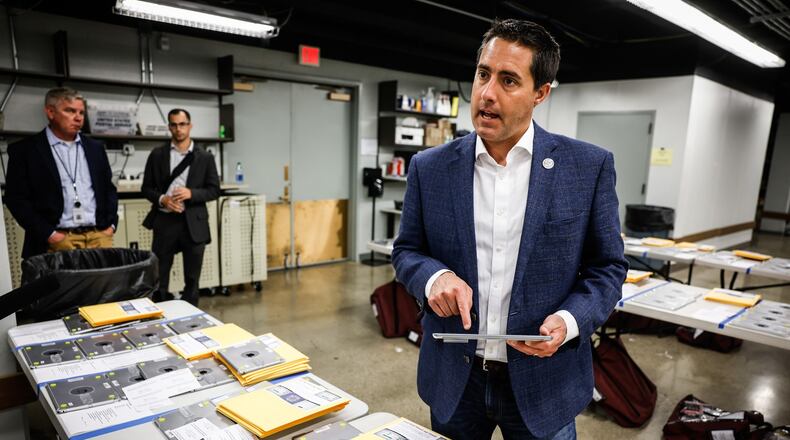Issue 2, a proposed constitutional amendment on the Nov. 8 ballot, would change that: explicitly barring non-U.S. citizens from voting in state or local elections, even if they’re longtime legal residents of Ohio.
The issue stems from 2019, when the village of Yellow Springs held a referendum on whether to allow people who were residents but not U.S. citizens to vote for local offices. It passed, but never went into effect because Ohio Secretary of State Frank LaRose ordered Greene County not to accept any voter registration forms from noncitizens.
Yellow Springs Council President Brian Housh told legislators the village “didn’t think it was that big as a deal,” as it only allowed voting on local issues.
LaRose pushed legislators for a legal ban on noncitizen voting.
LaRose said allowing noncitizens to vote at any level would create headaches for county boards of election, requiring a separate system for voter registration and ballot types, and possibly a separate set of voting machines.
He warned that the movement could spread beyond Yellow Springs, alluding to Chris Ronayne, Democratic candidate for Cuyahoga County executive, who said during a recent Global Cleveland forum that if a mayor in Cuyahoga County wanted to let taxpaying resident immigrants vote in local elections, he’d support that mayor under Ohio’s city home-rule law.
Do we need this?
“Really I think a lot of people have thought ‘Do we really need to do this?’” LaRose said during an Oct. 6 news conference on Issue 2 at the Ohio Statehouse.
He gave an emphatic yes, saying it has always been assumed that noncitizens were already barred from voting.
That’s not quite true, according to Stateline, the Pew Charitable Trusts’ reporting arm. From the founding of the country until 1926, 40 states at various times allowed noncitizens to vote in local, state and federal elections. Documentation and citizenship meant little and those rules were loosely enforced, said Marc Clauson, professor of history and law at Cedarville University.
States began to limit or prohibit voting by noncitizens from around 1880 to World War I, likely driven by an influx of immigrants and war-era suspicions, he said.
It wasn’t until 1996 that the federal government formally prohibited noncitizens from voting in federal elections.
Measure passes General Assembly
In May, the Ohio House passed House Joint Resolution 4 by a 68-28 vote with the support of all Republicans present plus five Democrats to reach the required three-fifths margin for inclusion on the fall ballot. The resolution, introduced by state Reps. Jay Edwards, R-Nelsonville, and Bill Seitz, R-Green Twp., passed the Senate unanimously on June 1.
“Senate Democrats did not oppose this legislation because the constitution already states that you must be a citizen to be eligible to vote in Ohio,” said Casey Rife, deputy communications director for the Ohio Senate Democratic Caucus.
If a simple majority of the electorate approves it Nov. 8, Issue 2 will be added to the Ohio Constitution.
Some House Democrats who opposed the resolution denounced it as a purely political move aimed at taking away cities’ home rule.
The ACLU of Ohio isn’t taking a position on Issue 2, according to its chief lobbyist Gary Daniels; but he described it to legislators as “wholly unnecessary,” playing to voters who are “unhealthily obsessed” with the falsehood that President Joe Biden’s election in 2020 was illegitimate and that Ohio’s voting systems are not secure.
The nonpartisan Legislative Service Commission considers noncitizen voting in local elections a gray area, LaRose told legislators. The home rule law for cities might allow localities to legalize it, he said.
San Francisco and a few towns in Maryland, Vermont and Massachusetts allow noncitizens to vote in local elections.
“These bad coastal ideas have a way of bubbling into the heartland unless we act,” Seitz said at the Oct. 6 news conference.
He said rural voters “better wake up” to the possibility that noncitizens in cities could vote for tax rates on jobs in cities that are held by commuters.
LaRose said allowing noncitizens to vote would “cheapen the value of citizenship.” He was seconded by Luis Gil, Republican candidate for Franklin County commission and a naturalized citizen from Venezuela. Gil, who described himself as campaigning against “socialism,” said most immigrants support voting being reserved for naturalized citizens.
Small number affected
Only about 170 of Yellow Springs’ 3,800 residents are foreign-born, and most of those are naturalized citizens, according to 2020 U.S. Census data. Housh estimated that legalizing noncitizen voting there would affect about 30 people: business owners, residents with children in local schools who have a stake in village affairs. According to census figures, the number of potential noncitizen voters appears to be 26.
According to figures from the Washington, D.C.-based American Immigration Council, about 5% of Ohioans were immigrants in 2018, with just over half of those being naturalized citizens.
Undocumented immigrants made up about 17% of the immigrant population, leaving 172,157 people as noncitizen legal residents. Based on the state’s population of 11.6 million at the time, that means about 1.5% of Ohio residents are noncitizen immigrants potentially eligible to vote, if the standards Yellow Springs proposed were to be adopted statewide.
Out of 8 million people registered to vote in Ohio, election officials annually find “fewer than 100″ noncitizens who have tried to register, LaRose said. Only a “few dozen” cases are referred to prosecutors for actually attempting to vote, he said.
About the Author

